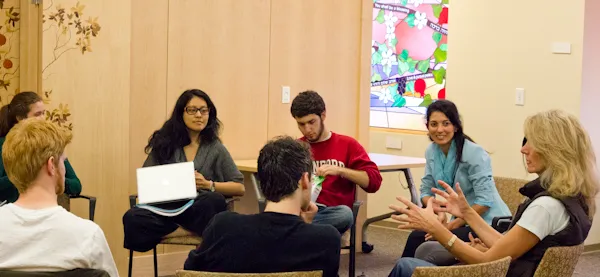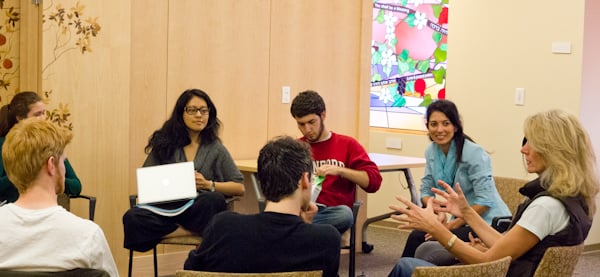
“You’re the engine of improving the world today,” said Helen Stacy, a senior fellow at the Freeman Spogli Institute (FSI) for International Studies, to a student activism focus group Monday evening. “So we want to give you more of what you need to be a platform — to help you spread your word.”
Stacy, a coordinator of FSI’s Program on Human Rights (PHR); Nadejda Marques, PHR program manager; and four members of the student advisory board hosted PHR’s first coalition meeting with students Monday at Koret Pavillion to discuss how the program can better support the needs of students interested in human rights — academically or extracurricularly.
Student leaders representing Six Degrees, Stanford Amnesty International, Stanford Students for Palestinian Equal Rights (SPER), Stanford Students for Queer Liberation (SSQL), Stanford Students Say No to War (SSNW) and STAND attended the event.
Stacy began by explaining PHR’s main objectives.
“We have a goal of being, first of all, a melting pot of human rights research from around the University,” Stacy said. “Our first function is to be a place where human rights is broadly defined, and faculty, researchers and students can find a home.”
Stacy added that PHR’s second goal is to raise awareness and attract Stanford research on a different human rights topic each year. This year’s topic is human trafficking, she said.
Stacy said that PHR needs student input to determine these topics.
“In years going forward, we want to make sure our student advisors are responding to the human rights issues [students] think are hot — that need attention right now, that need action, research, activism, focus by the University and focus by the world,” she said.
Student advisory board and STAND member Jared Naimark ‘14 said that the best way to achieve this task is to facilitate better coordination of information about student groups, academic programs and research opportunities.
“We don’t necessarily have a grand vision for what this entity that we’re forming is going to look like, but I think the idea of having representatives from all these different human rights groups come together every once in a while and talking about what they’re doing with their group would make that process of collaboration a lot smoother,” Naimark said.
Naimark added that another goal of the PHR coalition is to explore ways to connect student groups to academic research from FSI associates.
Tessa Ormenyi ‘14, another advisory board member and a participant in SSQL, discussed some initiatives the group is considering, including putting together a career and internship database in human rights and having PHR help facilitate student events.
Stacy and Marques addressed implementation of such ideas by calling for a consolidation of resources.
“What I think we might be able to do with some collective action is to maintain a database of professors who are working in human rights, who are teaching human rights units … [and] professors who are willing to supervise longer-term research projects in their particular field of expertise,” Stacy said.
PHR currently hosts lists of affiliated faculty and courses and student groups, but neither of these lists reflects information from the current academic year.
In terms of institutional support for student groups and events, Stacy added that PHR currently offers small grants — from $100 to $200 — to help groups purchase refreshments for events.
Marques said that PHR currently uses its Facebook group to publicize events that student groups send to it, but does not post the events on its official website.
Marques also commented on the potential for a minor in human rights.
“Ultimately what we want is to have the University offer human rights as a concentration,” Marques said.
“The idea is to persuade the University that there’s enough student interest at Stanford, that interest has been sustained over time and that there’s student demand that the University has to supply,” Stacy said. “We’re in a position to make that case, provided that we’ve kept track of the steps leading up to it.”
Stacy concluded that an official academic program in human rights would improve how Stanford contributes to the field in relation to its peers.
“We want to make sure Stanford has a similar human rights presence at the undergraduate and graduate levels as other universities,” she said. “Right now we don’t, and we need to fix it.”
When addressing challenges facing student action groups, the focus group commented that it’s difficult to see which campus events are taking place and that co-sponsoring with other groups — or even asking other organizations to forward information to other mailing lists — has not been very successful.
“If we could have someone from each group who knows everyone else in the other human rights groups, it would make it easier [to co-sponsor and publicize],” Naimark said, speaking from his involvement with STAND.
Marques clarified that PHR does not wish to make student groups dependent on one another.
“It’s not centralizing — it’s more coordination,” Marques said at the conclusion of the meeting. “We want to be able to coordinate the work of different groups on campus.”
Tenzin Seldon ‘12, a member of PHR’s advisory group, commented on what she hopes will develop going forward. Seldon serves as student-at-large on The Daily’s Board of Directors.
“My hope is that this advisory group can echo the sentiments of what Stanford students want and need and should have on campus,” Seldon said. “I hope that students with an interest in human rights can find every channel … every avenue to get involved.”
